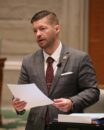JEFFERSON CITY, Mo — State Sen. Lincoln Hough, R-Springfield, discusses Mental Health Awareness Month: The Need for Transformative Investments into Behavioral Health Care.
The month of May is Mental Health Awareness Month. Our focus this month should be supporting our own family and friends, as well as those we do not know, who live with a substance use disorder or a severe mental illness. These diagnosed health conditions have long been underserved and underfunded in this country. In fact, studies have shown that individuals diagnosed with a mental health condition have, on average, a 25-year shorter life expectancy. However, only recently have we focused our attention and acknowledged that mental illness is a real epidemic. It’s not only an epidemic that affects families and friends, but also an epidemic that affects workplaces, law enforcement agencies and local health care providers. The COVID-19 pandemic has created a ripple effect of increasing and exacerbating mental health concerns across our communities.
These issues in behavioral health will not go away without transformative, generational investments into the access of services, a continuum of care, crisis response and placements that will connect individuals in need to immediate treatment. The Missouri Legislature, over the past few sessions, has realized that our state, as well as the nation, are woefully behind on funding these changes. The reality is that law enforcement and hospitals are not the best or most cost-effective treatment providers for those experiencing a behavioral health crisis. We’ve also seen that we need a more robust entry into treatment based on geographic locale, and we know we need a better crisis system that ensures a one-call, immediate care approach. Because of this, we have invested:
$15 million for a statewide network of behavioral health crisis centers (BHCCs) that focus their care for individuals in crisis, by having mental health professionals available to triage, assess and provide immediate care to stabilize the crisis and connect the person to the appropriate follow-up treatment. This frees law enforcement to do the important jobs of protecting our communities and frees up emergency rooms while being more cost-effective.
$5.5 million for 50 additional Community Behavioral Health Liaisons (CBHL) positions working with local law enforcement agencies and courts. Their goals are to build strong community partnerships between Community Mental Health Centers and coordinate access to behavioral health services for individuals referred to them by law enforcement and courts. CBHLs have received an average of 14,180 referrals per year from law enforcement agencies across the state and engaged with those Missourians to connect them with the necessary resources and behavioral health services they need. Of those referred to a CBHL in the last year, 72% of them were not found to be receiving any behavioral health treatment. Through the CBHL program, people with behavioral health issues who have frequent interaction with law enforcement and the courts will have improved access to behavioral health treatment.
$150 million for increased statewide access to community mental health providers. This first-of-its-kind investment will provide necessary capital improvements for providers and will allow them the flexibility to reach further into our rural areas to serve those who may have traveled great distances for treatment in the past, or who may have gone without the necessary preventive care and treatment they needed.
$30 million for the preparation of our crisis response system to support the new National Suicide Prevention Lifeline (NSPL) number, 9-8-8. Congress enacted this three- digit number as an easier way to call for urgent crisis care. The Missouri Legislature, in a bill that I sponsored in the Missouri Senate, will also now require the printing of 9-8-8 on all school IDs for grades 7-12 and for our higher education students. Right here in Missouri, suicide is the second leading cause of death in our children between the ages of 10 and 24. This tragic statistic must change. We must do better in providing care when it’s desperately needed, and having this number available for our students, friends, families and citizens to call, text or chat 24/7 will save lives.
These are just a few of the investments into the behavioral health care system we have made here in Missouri. The need for mental health and substance use services will not go away anytime soon. My colleagues and I must remain vigilant to stop the ripple effects that the COVID-19 pandemic has had in our communities relating to mental health and crisis situations.

Lincoln Hough is a Republican party State Senator from Springfield.



